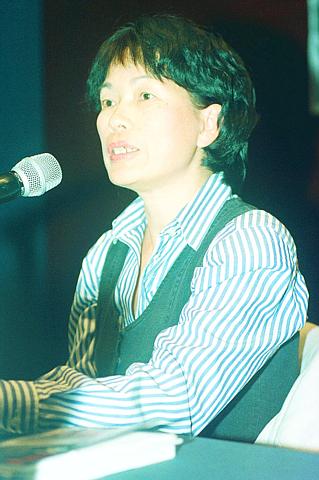At a media gathering to launch her new book yesterday, Lung Ying-tai (龍應台) said transforming herself from a writer and social critic to director of the Taipei City Government's new Bureau of Culture was no small task, but she hopes her undertakings will influence the Chinese-language community worldwide.
Lung, who calls her absence from from Taiwan since 1987 "exile," returned from her base in Germany just last Thursday. Today, she takes her post as head of the culture bureau, now under the auspices of a preparatory committee.
One day before her new assignment, however, Lung said she wanted to retain her role as a writer and interact with her readers.

PHOTO: DAI LI-AN, LIBERTY TIMES
But the occasion yesterday perhaps gave her a taste of the future. Although she prefers to think of herself as an expert in "avoiding cameras and reporters," she was welcomed by just that -- a roomful of journalists -- together with her "readers."
"Sitting here, I have already started to adapt myself to my new role," Lung said.
"As a writer, I try to avoid TV coverage as much as I can because I am afraid of being recognized when I walk down the street. But as the director of the Bureau of Culture, I cannot do this. I have to articulate my concepts through the media so as to make myself understood," said Lung.
One of her colleagues offered her some words of caution at yesterday's event. Writer Yang Chao (楊照), who was invited to speak to the audience with Lung about her new book, warned of a "transformation" after taking her new post.
"Maybe three and a half years from now, she will be like [early 20th century writer and social critic] Lu Xun (
Lung, renowned for her sharp observations on social phenomena as well as her idealism, returned his comments with a smile.
"Perhaps from tomorrow [meaning today], I'll start attending the `cram school on darkness' ... In history, although idealistic, passionate people have ended up frustrated, I still appreciate a sort of human glory [in these precedents]; it's something I am willing to pursue," she said.
"Taipei nowadays sits at the center of the Chinese-language community worldwide, not at its margin. If the cultural projects in the city go well [after I lead the bureau], then my influence on the Chinese-language community will no longer be through my writings but through other means," she said.
Meanwhile, Lung said even her readers in China have shown concerns over the fact that a KMT-run city government is willing to recruit a writer like her -- someone famous for her criticism of the KMT -- as a civil servant.
The city's plan to establish the bureau had been aborted by partisan disputes in the city council under former mayor Chen Shui-bian (
The dispute was finally settled when Mayor Ma Ying-jeou (馬英九) beat Chen last December. The council decision passed a resolution to establish the bureau in July.
The bureau, which will begin operations in November, will be Taiwan's first cultural bureau at the local government level.

DAREDEVIL: Honnold said it had always been a dream of his to climb Taipei 101, while a Netflix producer said the skyscraper was ‘a real icon of this country’ US climber Alex Honnold yesterday took on Taiwan’s tallest building, becoming the first person to scale Taipei 101 without a rope, harness or safety net. Hundreds of spectators gathered at the base of the 101-story skyscraper to watch Honnold, 40, embark on his daredevil feat, which was also broadcast live on Netflix. Dressed in a red T-shirt and yellow custom-made climbing shoes, Honnold swiftly moved up the southeast face of the glass and steel building. At one point, he stepped onto a platform midway up to wave down at fans and onlookers who were taking photos. People watching from inside

A Vietnamese migrant worker yesterday won NT$12 million (US$379,627) on a Lunar New Year scratch card in Kaohsiung as part of Taiwan Lottery Co’s (台灣彩券) “NT$12 Million Grand Fortune” (1200萬大吉利) game. The man was the first top-prize winner of the new game launched on Jan. 6 to mark the Lunar New Year. Three Vietnamese migrant workers visited a Taiwan Lottery shop on Xinyue Street in Kaohsiung’s Gangshan District (崗山), a store representative said. The player bought multiple tickets and, after winning nothing, held the final lottery ticket in one hand and rubbed the store’s statue of the Maitreya Buddha’s belly with the other,

‘NATO-PLUS’: ‘Our strategic partners in the Indo-Pacific are facing increasing aggression by the Chinese Communist Party,’ US Representative Rob Wittman said The US House of Representatives on Monday released its version of the Consolidated Appropriations Act, which includes US$1.15 billion to support security cooperation with Taiwan. The omnibus act, covering US$1.2 trillion of spending, allocates US$1 billion for the Taiwan Security Cooperation Initiative, as well as US$150 million for the replacement of defense articles and reimbursement of defense services provided to Taiwan. The fund allocations were based on the US National Defense Authorization Act for fiscal 2026 that was passed by the US Congress last month and authorized up to US$1 billion to the US Defense Security Cooperation Agency in support of the

HIGH-TECH DEAL: Chipmakers that expand in the US would be able to import up to 2.5 times their new capacity with no extra tariffs during an approved construction period Taiwan aims to build a “democratic” high-tech supply chain with the US and form a strategic artificial intelligence (AI) partnership under the new tariffs deal it sealed with Washington last week, Taipei’s top negotiator in the talks said yesterday. US President Donald Trump has pushed Taiwan, a major producer of semiconductors which runs a large trade surplus with the US, to invest more in the US, specifically in chips that power AI. Under the terms of the long-negotiated deal, chipmakers such as Taiwan Semiconductor Manufacturing Co (TSMC, 台積電) that expand US production would incur a lower tariff on semiconductors or related manufacturing